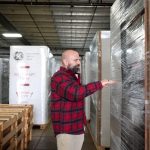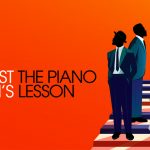2005-11 Vital Source Mag – November 2005
Industrial Nature
By Evan Solochek Nebulous shapes and architectural insight, the seemingly mismatched marriage of organic and synthetic, thrive within the sculptures of acclaimed artist Kendall Buster. Somewhere between abstract abodes and biological remnants, her large-scale creations entice both the eye and the body, and offer the viewer the rare opportunity to truly experience art. These mammoth orbs of steel and South African shade cloth are reminiscent of a cored pear or a beehive with a slice removed. These missing cross-sections are an essential component of one of Buster’s chief intentions. The “accessible interiors,” a distinguishing characteristic in Buster’s work, allow for a more profound interaction with the piece. The onlooker is invited inside to not only view the structure, but to be enclosed within it. “For a lot of people, it’s the simple act of penetrating a form,” says Buster. “You’re so accustomed to having this relationship to a sculpture where you’re over here and the sculpture is there and you’re walking around it and very separated from it. You can certainly enter it with your eye, but to enter a piece with your body is a kind of commitment.” Once inside, a myriad of reactions ensue. From playfulness and ease to uneasiness and intrigue, Buster wants the viewer to respond in some manner, any manner, just as long as it is genuine and unexpected. Influenced by the work of twentieth-century theorists Jacques Lacan and Michel Foucault, Buster attempts to incarnate their thoughts on the act of seeing and being seen. Fusing biology with architecture, Buster creates imposing sculptures that are interactive playgrounds where exploration and physical interaction are encouraged. Buster extends this facet through the use of translucent fabrics, which allows viewers to interact with one another by way of the sculpture. “Those inside the piece can see those outside the piece and vice versa so there is a little bit of a play there, which I find very interesting,” says Buster. “[The inside] is a small space, an intimate space. It’s truly a chamber and that leads to feelings of either enclosure or comfort. I like this idea of something being both comforting and threatening.” Suggestive of a cocoon or a womb, these membrane-covered structures envelope the viewer in a manner foreign to most human adults. Buster, who is currently a professor of sculpture at Virginia Commonwealth University’s School of Arts, finds the worlds of biology and architecture intrinsically linked. “I think there are a lot of interesting things to think about in terms of architecture’s biological roots and the whole notion of how biological forms have informed certain kinds of designs,” says Buster. “For me, the vessel and architecture are really about marking an empty space.” Having studied microbiology at the University of Alabama in Tuscaloosa, Buster has always been fascinated by biological structures. From fungal formations to exoskeletons, Buster’s science background is clear in her sculptures. “In one sense, I know it’s a very romantic notion, but there is a part of me that is very attracted […]
Nov 1st, 2005 by Vital ArchivesNeil Young
By Blaine Schultz Reprisewww.neilyoung.com Every record Neil Young releases is an enigma in waiting, and Prairie Wind, with its deft orchestral passages, swelling horns and bluegrass touches, is no exception. On Prairie Wind Young seems to say, “Let me make a record with people I enjoy playing with.” His father’s slide into Alzheimer’s and subsequent passing leads Young to meditate on his own past and take stock. The title track finds Young in that 3 a.m. voice, singing, “Trying to remember what my Daddy said / Before too much time took away his head;” a female vocal chorus echoes “prairie wind blowin’ through my head” as a horn section punches away at Young’s harmonica shards. “Far From Home” is the other side of the coin, buoyed by the horns and sounding like a Saturday-night revival, Young tells of a trek from the trans-Canada Highway to the Promised Land of money and big cars. And only then can you bury him on the prairie. When Young lapses into a sentimental mood (“Falling Off the Face of the Earth,” “It’s a Dream,” “Here For You”) to pay tribute to friends and family, he avoids mawkishness. “When God Made Me” calls to task in a sincere ballad those who have interpreted God’s will since day one. But he’s not afraid to turn the camera on himself. “He Was the King” is a good-natured romp through memories of Elvis and “This Old Guitar” is a love song written for Hank Williams’ Martin guitar—Emmylou Harris’ vocals only sweeten the deal. “When I get drunk and seeing double, it gets behind the wheel and steers / This old guitar ain’t mine to keep, it’s only mine for a while.” VS
Nov 1st, 2005 by Vital ArchivesSigur R’s
By Eric Lewin Geffenwww.sigur-ros.co.uk When Tortoise and Low first wrote the term “slow core” into the hipster dictionary, the proverbial jury was left to ask, “Is this where rock has lead itself, or are these droning songs little more than a cop-out for bands who don’t want to try?” After Sigur Rós’ additions to the formula and a recent surge of popularity among the indie proud, the verdict seems to be an acquittal. Compared to Rós’ back catalogue, particularly Ágætis byrjun (translated as “an alright start”) and the pretentiously titled ( ), Takk is considerably more subdued, but strange nonetheless. Songs like “Glosoli” and “Milano” build predictably, yet beautifully, leaving little room for argument about Rós’ predilection for the grandiose. “Gong” lets Rós’ Bends-era Radiohead influence show, an experiment held together by Jónsi Birgisson’s Thom Yorke-like wail. And speaking of vocal borrowing, check out the Chris Martin impression on “Anduari” and “Svo Hljott.” Coldplay really is everywhere these days! There’s no room for fence-straddling when it comes to Sigur Rós. With Takk, many are now heralding Rós as the best band in the world and ready to hand the championship belt over immediately. To others, Sigur Rós is about as exciting as a dream about mowing the lawn. Maybe the nay-sayers are confused or just bored. It’s also possible that they just liked Sigur Rós more the first time, when they were called My Bloody Valentine. VS
Nov 1st, 2005 by Vital ArchivesPaul Weller
By Paul Snyder Yep Rocwww.paulweller.com Yep Roc Records is hailing As Is Now as a return to form from the man who brought us Wild Wood and Stanley Road a decade ago. This is a puzzling statement, considering Weller’s never taken a drastic step away from the songwriting that anchored his 1990s classics. It’s just that his albums haven’t been as popular. And truth be told, it may be because Oasis isn’t that popular anymore, either. No one championed Weller more than Noel Gallagher in the mid 90s, and the slew of Britpop bands citing Weller as an influence (even Morrissey covered “That’s Entertainment”) put the man in the center of the movement, whether he liked it or not. Wild Wood and Stanley Road were fine albums. But so was Heavy Soul. And Heliocentric. And Illumination. And As Is Now is a great record, too. It follows Weller’s “it is what it is, take it or leave it” songwriting formula to a T, but it also shows the old man still has a lot of spunk. “From the Floorboards Up” recalls his aggressive Jam days, “Here’s the Good News” is a piano pounding foot-tapper and “Come On/Let’s Go” could be viewed as a three-minute distillation of Weller’s entire philosophy on life: “Come on, baby let’s go / And you say ‘Where to?’ / I say, ‘I don’t know – I just need to run / And you need it too.’” It has its rockers, its lullabies, and its mid-tempo meditations. It makes a defiant statement and then sighs a thought from the back recesses of the mind. It’s really not that far detached from the 24-year-old who wrote “Town Called Malice.” VS
Nov 1st, 2005 by Vital ArchivesRy Cooder
By Barry Wightman Nonesuchwww.ryland-cooder.com Ry Cooder, the guitarist widely known these days for Buena Vista Social Club, in which he showcased pre-Castro era Cuban musicians, now offers the world the melodic and jumpy Chavez Ravine. That’s CHA-vez. Just as he provided a venue for aging Cubans before they were gone and forgotten, Cooder, in 15 songs, shines a light on the unknown tale of how a dusty hillside Los Angeles Mexican neighborhood known as Chavez Ravine was razed in the 1950s in a “greasy handoff” to the newly arrived Dodgers baseball team. Think of the movie Chinatown. Crooked red-baiting right wing politicos, innocent citizens believing “it can’t happen here,” cool cats being beaten up by GIs, and a UFO-driving Space Vato (space guy) who recognizes the Ravine as the hip place to land; these are the players in Cooder’s loving 21st century concept album. The beautifully packaged Nonesuch CD includes a booklet worthy of a very small coffee table. The record has a handmade, non-digital feel with an airy sound that hints at L.A.’s El Hoyo Club in 1955. The record’s opening track, “Poor Man’s Paradise,” is driven by Cooder’s clean guitar and jazzy harmonies; “El UFO Cayo” is a slow, dreamy, late night swirl of guitars. “Muy Fifi” rocks with a thumping bass under L.A. legend Ersi Arvizu’s gutsy vocals. “3rd Base Dodger Stadium,” a lovely lament sung beautifully by Hawaiian singer Bla Pahinui, recounts how former residents of Chavez Ravine can pinpoint where their own home plate used to be. We should all be so lucky. VS
Nov 1st, 2005 by Vital Archives




















